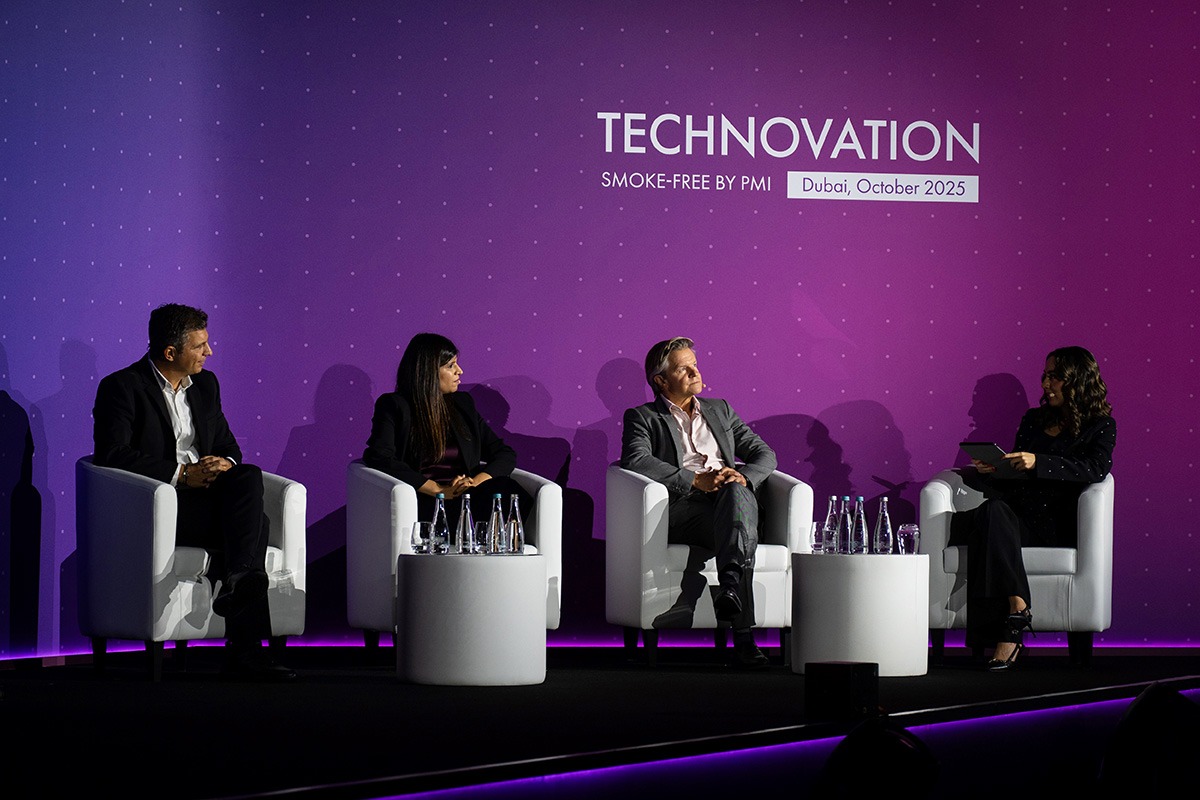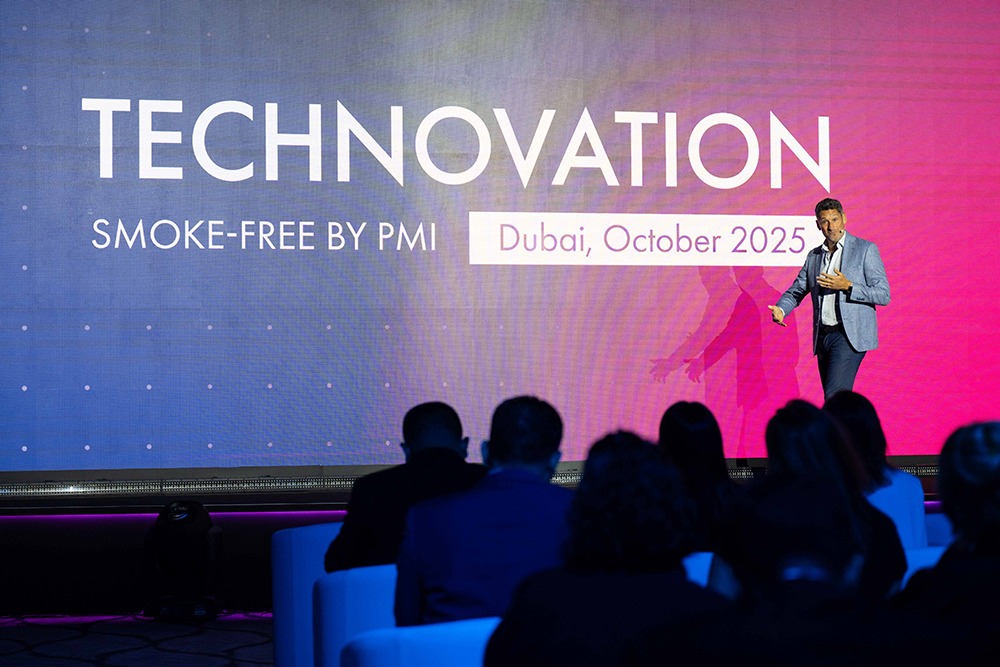PMI vision for a Smoke-Free Future: Christos Kiritsis on innovation, challenges, and global transformation

By Wilson D’cunha
Director – PR & Communications, The Times Kuwait
At the Technovation Smoke-Free Event held in Dubai on 8 October 2025, Philip Morris International (PMI) highlighted its global and regional initiatives aimed at creating a smoke-free future.
In an exclusive interview with The Times Kuwait, Mr. Christos Kiritsis, Vice-President of Smoke-Free Products for South & Southeast Asia, the CIS, and the Middle East & Africa, shared the company’s commitment to helping ‘adult smokers’ transition away from combustible cigarettes through innovative, science-backed alternatives.
He also provided insights into PMI’s progress in markets with deep-rooted smoking cultures, including Kuwait, and reflected on his personal drive to lead this global transformation.
Kiritsis emphasized that achieving a smoke-free world will require collaboration between governments, scientists, the media, and consumers.
He highlighted successes in countries such as Japan, where more than half of smokers have already switched to smoke-free alternatives, and Sweden, where adult smoking rates have dropped to 5% making it a smoke free country. He noted that innovation, education, and tailored solutions are central to PMI’s strategy. The discussion underscored the company’s focus on adapting products to local preferences, engaging stakeholders, and expanding public awareness, particularly in regions like Kuwait and South Asia, where smoking remains culturally entrenched but interest in modern, safer alternatives is growing.

Kiritsis also discussed PMI’s vision for a smoke-free future, highlighting the importance of market adaptation, regulatory engagement, education, and technology. He emphasized that achieving a world without cigarettes requires collaboration among governments, scientists, the media, and consumers – a mission PMI continues to advance with determination across diverse regions.

The following is the full text of the interview:
Times Kuwait: Is there a realistic possibility that you see a smoke-free world by 2035?
Philip Morris International: It aligns with our overall ambition to accelerate the existence of smoke-free products and help smokers switch from combustible cigarettes.
Is it realistic to eliminate cigarettes globally by 2035? Not entirely, because we have over a billion smokers today. In some countries, however, progress is already evident. In Japan, for example, more than half of smokers have already switched, while in Sweden, adult smoking rates have fallen to 5%. So, in specific markets, yes, it’s realistic.
Currently, more than 40% of our revenue comes from smoke-free products. Our objective is that by 2030, over two-thirds of our revenue will come from these products. This means that in some countries, we could be very close to achieving nearly complete adoption.
The key is support from all stakeholders—regulators, the scientific community, media—to ensure smokers know about better alternatives. We must also continue innovating, because smokers have diverse needs: preferences, affordability, rituals, and sensory experiences. Our job is to make sure every smoker can find the right product for them.
TK: There are many smokers in Kuwait, and changing habits seems challenging. Do you have plans to increase adoption in Kuwait?
PMI: While there is a cultural acceptance toward smoking, we’ve already seen significant progress since launching IQOS and our vape products in Kuwait. People in Kuwait are interested in innovation, they like a modern lifestyle, and offering the right options is crucial.
The more choices we provide, the easier it is for smokers to take the first step. Once they try a smoke-free product—whether it’s IQOS, a heat-not-burn device, a vape, or a nicotine pouch—they begin to see the benefits, and switching becomes irreversible.
Our plan focuses on expanding product availability, aligning products with local culture, and activating the ecosystem—regulators, media, scientists—so that consumers understand, access, and adopt these products. With this approach, we expect accelerated growth in Kuwait.
TK: Are you seeing this progress mostly among Gen Z or older generations? The older generation seems harder to convince.
PMI: Innovation is often first adopted by younger adults. But even among adult smokers, some are open to trying new products. For older smokers, change takes longer because smoking is deeply embedded in their habits.
We address this by introducing new propositions tailored to their needs—improving awareness, addressing misconceptions, and offering flavors and technologies that align with their preferences. So while older smokers may take more time, we do have products designed for them.
TK: PMI has a bold mission for a smoke-free future. How do you see the Middle East and South Asia contributing to this vision?
PMI: South Asia is home to a significant portion of the world’s smokers—half of the global smoking population is in that region. The biggest challenge is market access; in some countries, in South Asia and even in the Middle East, smoke-free products are still banned.
Our focus is on opening markets, removing bans, and ensuring smokers understand the benefits of smoke-free alternatives versus combustible cigarettes. This region is critical because we cannot achieve a smoke-free world without addressing the majority of smokers here. We’re also developing products specifically for these markets.
TK: Many people in Kuwait worry about safety. What evidence shows that smoke-free products are less harmful?
PMI: Science shows that by eliminating combustion, smoke-free products reduce exposure to harmful or potentially harmful substances by an average of 95%. This research is endorsed by leading institutions like the U.S. FDA, which authorized IQOS as a modified risk tobacco product. Similar approvals exist in the UK and Germany.
We apply the highest safety standards—comparable to pharmaceutical manufacturing—across production and operations. Safety is a priority, and the science behind these products is robust and internationally recognized.
TK: On a personal level, what motivates you to drive PMI’s smoke-free future?
PMI: It’s incredibly rewarding to be part of a mission that can improve public health on a large scale. I’ve never imagined playing a role that could impact so many lives. It’s transformative and disruptive, much like major technological innovations in history.
What keeps me motivated is the fact that there are still millions of smokers who need access to knowledge, information, and better alternatives. Knowing that our work can help improve their lives is what drives me every day.


















